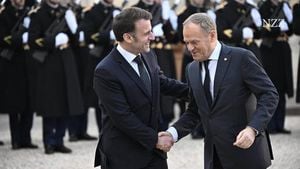Clive Palmer, the billionaire former politician, recently re-entered the Australian political arena with the launch of his new party, the Trumpet of Patriots. Unveiling its official logo adorned with the rattling words "honor omnia," the party has sparked controversy not only for its MAGA-inspired vision but also for its evident mishap with Latin translation.
During the launch at Parliament House on Thursday, Palmer, ever the showman, promised to cut government waste and reflected on his political ambitions for the upcoming federal election. The launch featured bright yellow billboards emblazoned with the party's logo depicting a gilded lion blowing a trumpet, superimposed on the Australian flag. The Latin wording, intended to communicate "honour above all," was confirmed as incorrectly translated by experts, raising eyebrows.
Professor Caillan Davenport, head of the Australian National University’s Centre for Classical Studies, was quick to point out the error. "Honor omnia is a mistranslation. It consists of a noun and substantive adjective which have no connection. They do not agree, nor is there a preposition or verb," he explained to The Canberra Times. The correct translation should have been "honor super omnia," which accurately captures the intended message.
This slip-up has led to discussions about the importance of historical accuracy, with Davenport noting, "People think it lends them an air of authority or authenticity,... but when you don’t get it right, it can come off as silly." Critics suggest this reflects not just Palmer's misunderstanding of Latin but also highlights alarming trends of misappropriating historical themes among the political right.
While Palmer is busy courting electoral candidates to run for all 227 lower and upper house seats, another shadow looms over Canberra—the impending decision-making on stadium funding. Liberal leader Peter Dutton finds himself under scrutiny as he sidesteps questions surrounding the ACT government’s use of the federal stadium. The existing lease for the use of the stadium expired at the end of last year, leaving many to wonder about the future of sports infrastructure should Labor lose the upcoming election.
Dutton’s repeated refusal to clarify his position has left residents anxious. Last year, he hinted at reprioritizing Canberra-centric funding during budget discussions, but his office has since remained tight-lipped about potential investments or even basic support for the existing facilities. Without joint funding agreements for construction underway, Canberra might brace for delays, much to the frustration of local sports teams.
This uncertainty parallels the criticism aimed at the political discourse within Canberra, dramatically brought to light by Ray Griggs, the recently retiring secretary of the Department of Social Services. Griggs, during his valedictory address at the National Press Club, voiced his concerns about deteriorated relationships between senior public servants and politicians, particularly during Senate estimates. He remarked, "There is an enormous power imbalance when we appear to a parliamentary committee." He pointed out how the environment had shifted to one of personal belittlement, complicity, and aggression.
Griggs' comments shed light on broader issues of workplace mental health within government departments, as claims continue to rise. He elaborated, stating, "What’s our biggest growth area in compensation is psychosocial, and people are getting destroyed at estimates, really damaged.” This points to serious repercussions from political conduct and public engagement strategies, which seem increasingly hostile, especially amid social media pressures.
Fundamentally, Palmer and Dutton’s political maneuvers reflect larger underlying frustrations felt by Australians toward political engagement at multiple levels. Questions arise surrounding governance, community welfare, and the execution of state politics. Advocates for responsible governance are calling for accountability built on engagement rather than division.
Griggs’ insistence on respect for public servants resonates concerning Australian ideals of fairness and democratic representation. He concluded by highlighting the contributions of diverse community perspectives to policy-making. The safety and integrity of interactions within such forums as parliamentary committees also merit serious consideration, particularly as elections approach.
Balancing the scales of respect, accuracy, and integrity appears to be the promising path forward—to combat the fading trust amid Australians toward their political leaders. With Palmer embodying the missteps of overblown ambitions and Dutton's reticent approach to federal support, the reflections from Griggs offer urgent calls for reflection. It is clear this political season demands more than mere promises; it requires earnest engagements to rebuild connections with constituents.



